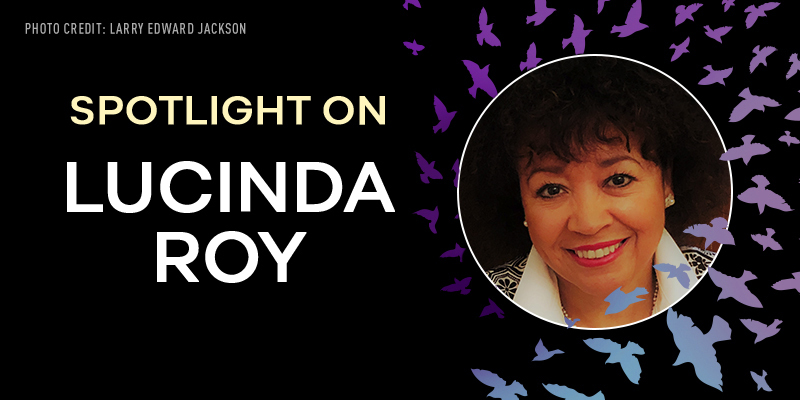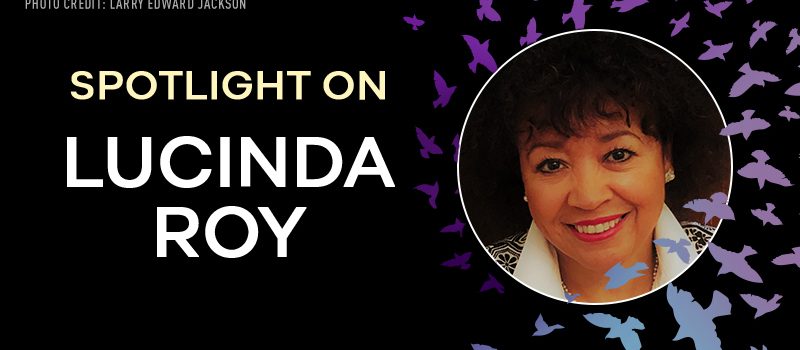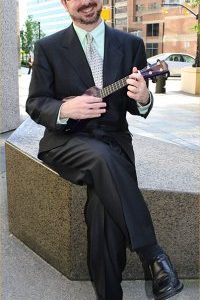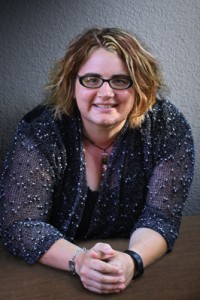Spotlight on: Lucinda Roy

Tell us a bit about The Freedom Race—the world where it takes place, and the characters who inhabit that world.
In The Freedom Race, which is set in the future, a second civil war, referred to as the Sequel, has transformed the country into the Disunited States. Other kinds of instability—climate change, refugee crises, ideological divisions, and pandemics—have also taken a toll. After the Sequel, rural areas of the Midwest and the South seceded to form the plantation-inspired Homestead Territories, the coastal states established the Eastern and Western SuperStates Alliance, and numerous cities declared themselves Urban Independent city-states.
Systems of oppression are premised upon an unequal distribution of power. In The Freedom Race, unequal power is rigidly enforced in the Homestead Territories, which are reliant upon imported and homegrown Black and brown labor. Homesteaders classify the enslaved as botanicals and refer to them as seeds. On hundreds of plantings, botanicals are forced to labor and mate so the Territories can “re-seed” itself. Among them is Jellybean “Ji-ji” Lottermule.

A so-called “Muleseed botanical,” Ji-ji lives on a planting in Virginia with Silapu, her alcoholic, suicidal mother, whose children have been snatched from her one by one. Ji-ji is her “Last&Only,” the child she cannot lose.
Only 15 at the opening of the book, all Ji-ji knows of the world outside the planting is what she has gleaned from the censored texts she straps to the underside of her bed. Inspired by the mythical, magical stories told by Uncle Dreg, a tribal wizard from the Cradle, and by Zyla Clobershay, a white teacher who dares to teach things not on the seed curriculum, Ji-ji trains to become Planting 437’s female runner rep in the annual Freedom Race so she can realize her dream of freedom.
Ji-ji’s closest friend, Tiro Williamsmule, trains as a male flyer-battler in the strange flying birdcage, invented by the enslaved to pay tribute to the needfulness of flight, and co-opted by steaders for profit. Tiro dreams of being the planting’s flyer rep in the Freedom Race.
Afarra, the last of the three friends, is an outcast the steaders call Cloth-33h. Afarra has raised herself, for the most part. She dreams of a time when her body will belong entirely to her and not be abused by others. Like Ji-ji, Afarra only has glimpses into who she can become.
For me, there is no more important element in fiction than point of view, which catalyzes, records, and interprets reality. I like to show the world characters see as they experience it rather than a world I interpret for them. Jellybean Lottermule’s world is often brutal and violent, yet it is also wondrous and inspiring. As the book progresses, Ji-ji is confronted with a reality she never dreamed of—one that challenges everything she believes, everything she is, and everything she can become.
The Freedom Race launches The Dreambird Chronicles. Can you give us any hints for what the future of the series holds?
I’m currently revising the second volume in the series, which I’ll finish, god willing, in the next few weeks. I’ve developed a deep admiration for writers of novel series and their supportive editors and agents!
In the next volume in the series, the world expands to encompass a much larger chunk of the Disunited States. We see things from the POV of multiple characters as their relationships evolve. Until a relationship is placed under stress, we have no idea how strong it is. Circumstances place a great deal of stress on these characters and a lot is revealed about them.
You’ve had a long and eminent writing career, first as a poet and then as a literary fiction and non-fiction writer, but The Freedom Race is your first foray into science fiction. Why the shift to speculative fiction? Does the genre provide opportunities that other approaches don’t?
Yes, I think it does provide new opportunities. Speculative fiction enables us to open an infinite number of doors to the known and the unknown. For me, the most exciting speculative fiction brings us closer to others’ trials and dilemmas, which, in turn, brings us closer to ourselves.
The Freedom Race exists on several different planes at once, I hope—realism and magical realism/surrealism, the past, the present and the future. The Prologue opens with an Origin Story that reverberates throughout the series, but we veer away from that innocence as the harsh reality of planting life comes into focus. The story is filled with allusions, markers, and clues—literary Easter eggs, in a way—as characters, whose lives are often extremely challenging, find scraps along the way and quilt them together into something meaningful. I think we all do this to some extent, and that speculative fiction embraces that type of difficult journey.
Your earlier novels were semi-autobiographical. Are there aspects of your life present in The Freedom Race too?
My first novel Lady Moses, set in London, the US, and West Africa, did contain autobiographical elements, though not as many as people thought. The Hotel Alleluia, my second novel, had far fewer—although I did at one time think about becoming a nun, which may explain why one of the four main characters in the novel is a novitiate.
For The Freedom Race, I drew upon what I experienced growing up poor, biracial, and female at a time when biracial children were often greeted with hostility. I don’t want to suggest I was unlucky; the opposite is true. My father, the Maroon carver for Jamaica, a role handed down from father to son since the 1700’s, left school at eight. He was a self-taught novelist and a gifted artist and sculptor. His art celebrated his African roots. (He painted a Black Holy Family and received stinging criticism for doing so, which only made him more determined to do it again.) My father worked in a Brillo factory and died in poverty, yet he left behind a rich artistic legacy.
I’ve lived and taught in a number of different places around the world. There was a coup while I was teaching in Sierra Leone. The country moved almost overnight from a democracy to an autocracy. Today, Sierra Leone is still recovering from a brutal war and from Ebola outbreaks. I returned some years ago to see if my former students had survived the conflict, and I visited again with the humanitarian organization CARE to study infant and maternal health. No doubt these experiences influence not only the political aspects of my work but also some of the plots in my fiction. In all my novels, Africa and the Diaspora have a presence.
Ji-ji finds solace and affirmation in drawing, as I do. In a deliberate act of rebellion, she draws a map of the planting, even though she knows that “imaging a planting” has dire consequences. I drew the map in the persona of Ji-ji, and it’s included in the book. It’s amazing the connection you can make with a character by drawing the world they see.
Like many characters in The Freedom Race, I have experienced violence and trauma. After the mass shootings at Virginia Tech where I teach, I wrote a memoir-critique called “No Right to Remain Silent” about what we can learn from tragedies like these. And like characters I write about I’ve experienced abuse. I never want to write casually about violence, but I think it’s dangerous to ignore how frequently violence ambushes the vulnerable. In The Freedom Race, Afarra, one of the young characters, devises her own coping mechanisms. She becomes Not-Here, Not-Now, removing herself entirely from the trauma of sexual abuse. Her imagination safeguards her sanity.
What writers, inside and outside the genre, influenced you? Have you always been a reader of science fiction?
In her youth, my mother was a repertory actor, so Shakespeare’s plays constituted my first intro to speculative writing. I read A Midsummer Night’s Dream and The Tempest when I was about 11 and memorized hunks so I could annoy my friends. (No surprise that I didn’t have many.)
I’ve been fascinated by the work of a range of writers, though most have been mainstream literary writers like Toni Morrison, Dickens, Austen, Bessie Head, Baldwin, Chinua Achebe, and Emily Brontë. (Brontë’s handling of conflicting points of view in Wuthering Heights is masterful.) Other writers of speculative fiction, like Tolkien and George R.R. Martin, appeal to me too—the former as a gifted landscape writer and the latter as a portrait painter who handles point of view with skill. I am also intrigued by the work of writers who approach genre from an unusual angle, like Octavia E. Butler, N.K. Jemisin, and Margaret Atwood. I think genre is more porous than we sometimes assume. There is a close connection between, say, Butler’s speculative novel Kindred, and the literary/magical realism in Maxine Hong Kingston’s The Woman Warrior and Morrison’s Beloved.
I’ve begun reading The Expanse recently because I love the TV series. The characterizations are nuanced, the cast multiracial, and the interplanetary politics rings true. I want to see how the books were translated onto the screen. I’ve also enjoyed sci-fi classics others have recommended like A Canticle for Leibowitz, though I got frustrated by a future with almost no women in it!
I’m a fan of what I would call disruptive screen sci-fi. I would love to chat with Stacey Abrams about the multiracial portrayals in Star Trek. (Abrams, as I learned fairly recently, is an avid Star Trek fan). I was thrilled by the movie Arrival because the protagonists’ initial reaction wasn’t “How can we kill these aliens?” it was “What can these strange, majestic giants teach us about themselves?” Beautiful.
You’re from London, but have lived in the Southeastern US for many years. How does your experience with those different cultures and landscapes inform your writing?
In addition to London and Virginia, I’ve lived for a time, as I mentioned, in Sierra Leone, as well as Arkansas, and Massachusetts. Each of these places informs my writing. The most obvious evidence of this is in the settings of my novels.
One of the joys of novel writing is rediscovering and re-seeing the places you thought you knew. The Freedom Race opens in a place near where I live in Southeastern Virginia, though it is a much more treacherous place in the future.
Is there anything else you’d like our readers to know? Upcoming work or other projects of note?
After I finish the second book in the series, I’ll work on the third. Working on this series with my editor Jen Gunnels at Tor has been a wonderful experience. I owe my agent, Jennifer Weltz, a debt of gratitude for realizing how well we could work together. I love the ways in which readers of speculative fiction dare to enter new worlds, and I look forward to helping bridge the divide that often exists—unfairly, I think—between literary and genre fiction.
I’m also working on a book of poems inspired by African and Caribbean art, and I yearn to get back to working on a series of oil paintings I began years ago on the Middle Passage. But I have graduate and undergraduate student-writers to teach, speaking engagements to do, and causes I care about to support, so I may not have time. But that’s okay. Writing and teaching are the most fulfilling things I’ve ever done. Most people never get to live their passions. I do every day. And for that I am grateful.
This promoted spotlight is exclusive to Locus Online.
Lucinda Roy is an award-winning novelist, poet, and memoirist, recognized for her keynotes on race and gender, creative writing, and education reform. Her writing has appeared in numerous newspapers and journals, including USA Today, the Guardian, and the New York Times. Her latest book is The Freedom Race, a speculative slave narrative. She lives in Blacksburg, Virginia, where, as a distinguished professor, she teaches creative writing at Virginia Tech.
 While you are here, please take a moment to support Locus with a one-time or recurring donation. We rely on reader donations to keep the magazine and site going, and would like to keep the site paywall free, but WE NEED YOUR FINANCIAL SUPPORT to continue quality coverage of the science fiction and fantasy field.
While you are here, please take a moment to support Locus with a one-time or recurring donation. We rely on reader donations to keep the magazine and site going, and would like to keep the site paywall free, but WE NEED YOUR FINANCIAL SUPPORT to continue quality coverage of the science fiction and fantasy field.
©Locus Magazine. Copyrighted material may not be republished without permission of LSFF.







